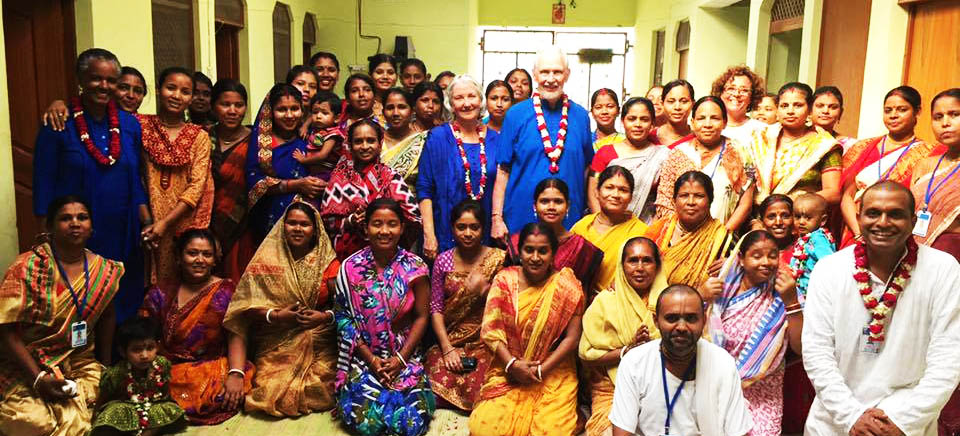Yesterday, after finishing some programs at the Ananda center in Sacramento, California, Devi and I had a few errands to run. Later, having finished our shopping, we were pulling onto the freeway entrance when we saw a family beside the road. The wife and child were sitting on a blanket, and the husband was holding a sign saying, “Our family is homeless. Can you help us?” Though we had but a moment to act, we lowered our window and gave them a small donation. But when we got home, Devi, remembering their eyes, remarked, “I wish we had given them much more,” and I, too, had the same feeling. That evening we both prayed for them during our meditation.
In one of the more memorable chapters in Autobiography of a Yogi, Paramhansa Yogananda relates the story of a boyhood visit to the holy city of Brindaban. Yogananda’s older brother, a disbeliever at the time, had challenged Yogananda and a friend to visit the holy city having no resources except an “unreliable” faith in God’s benevolence. Soon, even after being miraculously and sumptuously fed lunch, the friend’s faith began to falter.
Yogananda said, “’You forget God quickly, now that your stomach is filled.’ My words, not bitter, were accusatory. How short is human memory for divine favors! No man lives who has not seen certain of his prayers granted.”
Many people, perhaps most, never consciously pray to God but, nevertheless, He hears their every thought, every worry, every fear, and every need. That family, sitting beside the road, had been heard by God, and He inspired us to help them. If we had listened more carefully, He could have done more for them through us.
Worldly consciousness can find a thousand reasons to withhold aid. The devotee needs only one reason to give: because Divine Mother, in that form, is asking for help. Yogananda taught that the channel is blessed by what flows through it. Isn’t it the better part of wisdom to be on the lookout for opportunities to serve as God’s channel?
If we study the lives of the saints, we see that they hold nothing back. St. Francis gave away everything he owned; the Indian sadhu, Ramdas, gave a beggar the very clothing off his back; and Yogananda’s “bank” consisted of a small box with a few dollars in it so he would have a little money to buy things for others.
In a parable by the great poet, Rabindranath Tagore, a beggar is sitting beside a road when the king of the land approaches. Expecting a generous gift, the mendicant holds out his hand. He is shocked when the king asks, “What have you to give me?” The beggar grudgingly gives him the tiniest grain of rice. When he returns home that night and empties his purse, he finds there a single grain of golden rice, and wishes he had given his all.
Subtle threads of divinity connect everyone and everything on the planet. If you see someone in need—not only of money, but of a smile, or a kind word, or a helping hand—realize that, behind the form, Divine Mother is offering you a chance to serve as a channel for Her divine favors. When we give to others we find inner freedom.
Give God your all, no matter whether He comes disguised as a king or a beggar, and you will instantly feel His blessings in your heart.
In joy,
Nayaswami Jyotish


11 Comments
Dear Nayaswami Jyotish Ji,
Thank you for such a beautiful blog . Very inspiring and touching :-)
Thank you dear Jyotishji for this wonderful and very touching story. Also I liked what you said in this blog that “If we had listened more carefully, He could have done more for them through us.” This is kind of guidance for me.So thank you for sharing.
Thanks for the wonderful blog just wanted to clarify these are not the widows of Vrindavan these are from the skill development centre.Please clear it .
Thank you for clarifying. The caption on the picture was incorrect. Nonetheless, the desire to help others is the same.
Hi Manjeri, which photo is at the skill development center?
I was inspired by this article – the photo with the widows in Brindaban is very heartwarming. The thought occurred, though, that Swamiji told us not to give money to beggars, as it can encourage them in the consciousness of dependency. I suppose that discrimination is required. I see beggars only occasionally here in Silicon Valley, but there is a start difference between those whose consciousness fairly shouts, “I’m a loud-mouthed slacker,” and those who are truly in need – the mother, the transparently decent single woman in need, the truly mentally challenged.
It’s interesting that Swamiji said that. In seeming contrast, I have read that Yogananda gave to all beggars even though he felt that begging was not the ideal approach; perhaps it was the moral support that such gifts conveyed that he felt was most important. For me, it can be very hard to know where common sense ends and egoism begins, especially when one only has a moment in which to make a decision. Sometimes I have given to someone, only to realize later how they could have easily prevented or resolved their predicament, or achieved their goal, themselves. The same goes for charitable giving to organizations: will they actually use the money as carefully and wisely as I would? Or am I perhaps unwittingly more interested in giving than in actually achieving results? It seems that the best help is often really not in the form of a single gesture, but in carefully analyzed, deeply involved, ongoing, and comprehensive support, but the former does take a great amount of energy and commitment. If one cannot make such a commitment, then perhaps one should not allow the perfect to be the enemy of the good–better to make a small, even if imperfect, gesture. I suppose that ideally, cultivating discrimination in all such matters should be a consciously undertaken, ongoing project for one’s meditations and prayers–because beyond all the rationality and practical complications, the simple urge to share remains.
Thank you Jyotish. So true!
Beautiful, thank you.
Thank you, dear soul. I am reminded of the story of the three woodsmen roaming through the forest and finding the great wall. They needed each other’s help to climb up the wall to see over it. Thank God one of them came down and went back to his village to tell others of what he’d seen. Thank you, namaste.
Dear Nayaswami Jyotish , Thank you for this very inspiring, beautifully explained touching story and also for your own personal experience and wise counsel/guidance. It’s always a joyful anticipation for your and Devi’s next blog. Blessings to you both, Namaste